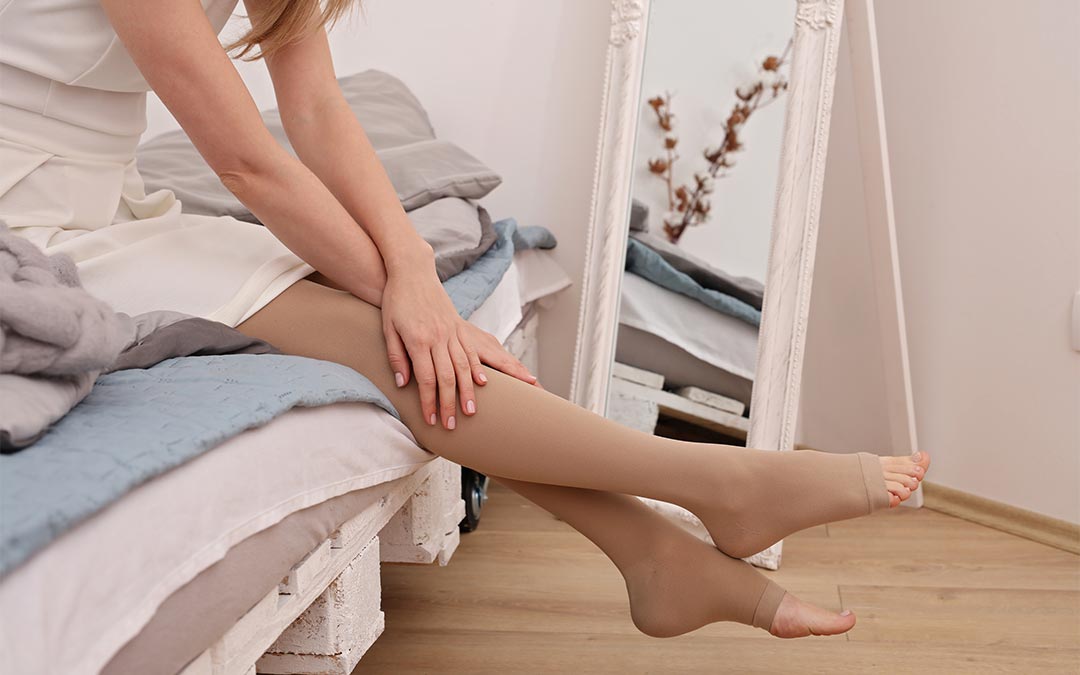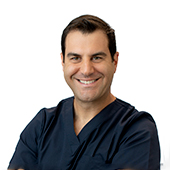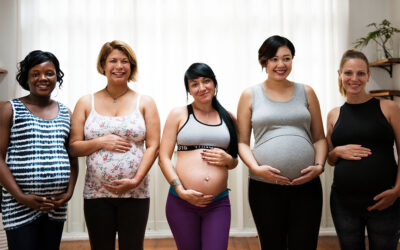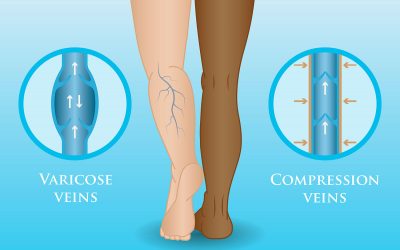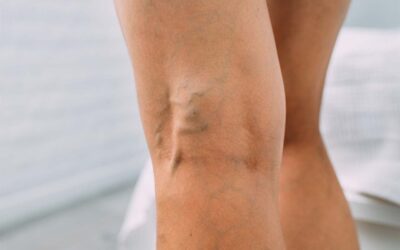For people with varicose veins in the legs, the painful symptoms are a daily challenge. Sometimes getting leg vein treatment immediately is not an option, perhaps because of location, pregnancy, or availability. In the meantime, could compression stockings help relieve the symptoms?
To understand what applying compression to legs with venous insufficiency can do for symptoms, we need to understand what is happening inside normal and abnormal leg veins. Veins are the blood vessels tasked with returning blood to the heart via one-way valves running along the interior vein walls. When these valves fail, blood leaks backward, and pools – causing the vein to swell up with blood and pop out on the skin as squiggly, bulging blue veins.
When this happens, uncomfortable symptoms usually appear. This may include throbbing, a dull ache in the legs, heaviness, restless legs at night, swelling, and pain. In this article, we’ll just be talking about the above symptoms, as they are the immediate symptoms that compression stockings can address. Click here to learn more about some of the other symptoms and venous disease progression.
Types of compression stockings.
There are three main types of compression stockings available for use with various conditions: medical or graduated compression, anti-embolism, and non-medical support stockings.
Medical or graduated compression stockings are designed to treat chronic venous disease and swelling. They have the greatest amount of compression at the ankle, decreasing all the way to the top of the stocking. Medical compression stockings are designed for ambulatory patients (people who can walk, as opposed to bedridden patients).
Antiembolism stockings also have graduated compression but are designed to lower the risk of deep vein thrombosis (DVT) in bedridden patients and are not meant for people who are able to walk.
Non-medical support stockings have an even degree of compression all over, not progressive compression, and are usually sold to prevent aching legs. Their compression is usually significantly lower than medical or antiembolism compression stockings.
How do medical-grade compression stockings help varicose veins?
When compression therapy is applied to legs with varicose veins, there are several mechanisms that benefit:
- Increasing speed of blood flow – the stockings compress the major veins in the legs and reduce their diameter, thereby increasing the velocity of the flow.
- Reversing venous hypertension – When blood pools because of venous insufficiency and veins “pop-out” on the skin surface, pressure is put on the vein walls in these areas, called venous hypertension. Compression stockings support the walls, preventing them from overstretching, effectively reversing the hypertension. (Note: as with the other benefits, this is not permanent, and hypertension returns when the stockings are taken off).
- Defying gravity – Leaky or incompetent veins are already working against gravity to push blood to the heart. Graduated compression up the legs helps lessen gravity’s drag on the flow.
- Supporting the calf-muscle pump – The calf-muscle pump is a collection of muscles in the legs that help circulation when they contract by squeezing blood along the veins toward the heart. Compression helps amplify and support this process.
- Improving lymphatic drainage and preventing swelling – Compression supports lymphatic drainage of a chronic build-up of fluid and swelling in the limbs.
There is strong research that shows better oxygenation of the legs and a reduction in the number of inflammatory cells in patients with active leg ulcers who wear medical compression garments.
Overall, patients with varicose veins of all levels of severity report improvement in symptoms like pain and swelling.
You will still need varicose vein treatment.
Using medical compression stockings to support varicose veins is a short-term measure, not a cure. We know that left untreated, varicose veins do not correct themselves and medical intervention by a vein doctor or phlebologist is necessary. However, compression stockings have been shown to relieve symptoms and prevent worsening of the condition.
We have a range of non-invasive treatments for varicose veins including endovenous laser ablation (EVLA), ultrasound guided sclerotherapy, VenaSeal (medical adhesive), and radiofrequency ablation. Our phlebologist selects the right treatment for you based on the severity and location of the problem vein.
Key Takeaways
- Varicose veins occur when blood leaks backward in the blood vessels intended to return blood to the heart.
- Compression stocking types: medical or graduated compression stockings, antiembolism stockings, and non-medical support stockings. Medical or graduated compression stockings are designed for use with varicose veins.
- Applying compression stockings can help varicose veins by increasing the speed of blood flow, reversing venous hypertension, moving blood toward the heart, supporting the calf-muscle pump, and improving lymphatic drainage & preventing swelling.
- Medical treatments for varicose veins include endovenous laser ablation (EVLA), ultrasound guided sclerotherapy, VenaSeal (medical adhesive), and radiofrequency ablation.

